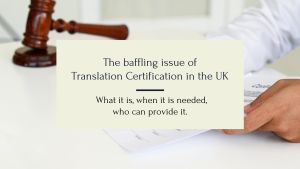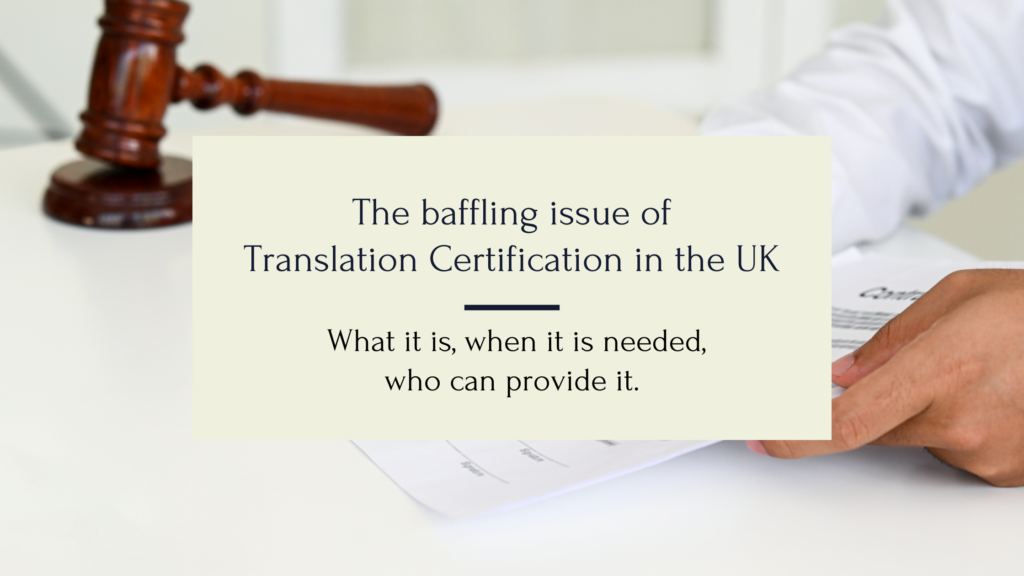
The baffling issue of Translation certification in the UK: What it is, When it is required, Who can deliver it

Have you recently found yourself in a situation where you were asked to provide a certified translation in the UK? If so, you may have wondered about the quandaries of translation certification.
Our guest author, Sebina Zisa-Davies, sheds some light on the matter.
What is a certified translation in the UK?
In the UK, a Certified Translation, also known as Official or Sworn, is simply one which comes with a statement made by the translator or translation agency guaranteeing its accuracy, along with the date, the translator’s credentials, and contact details. Certified translations are often signed and stamped and should be proofread for an added guarantee of accuracy.” They can be used in formal procedures and accepted by authorities, such as courts, universities, civic centres, etc.
Translations of this kind can be personal documents, certificates and diplomas, public deeds, documents involved in legal actions, expert witness reports, and commercial documents like contracts, financial statements, etc.
Government-certified translations are also required in circumstances involving other documents, like medical reports or expert opinions, that are part of a legal procedure, an audit, or an insurance company claim.
Who can deliver a certified translation in the UK?
A certified translation in the UK is a translation bearing a statement by the translator attesting to its accuracy, along with the date, the translator’s credentials and contact details.
Certified v Certification: A tale of confusion
I will begin by unravelling the terminology, as this is where the confusion often arises.
The terms certified and certification are sometimes used to refer to the translator, and other times referring to a document that has been conferred legal or official power as a result of a special kind of treatment.
Certification in reference to the translator
Certification by the government is essentially a license, which means that certain tasks can be performed only by “authorised”, “sworn”, or “public” translators (Stejskal, 2005). It is the formal process recognised by a testing authority through which a candidate is tested under specific criteria that demonstrate a particular performance standard. Upon successful completion of the test, the translator is licensed to perform tasks that can only be performed by “authorised,” “sworn,” or “public” translators (Stejskal, 2005).
Certification is also sometimes known as accreditation. Both terms refer to awarding a person or an organisation official recognition.
Protection, Formalisation and Regulation = increased credibility
The Translation sector is evolving and becoming more specialised. Regulatory standards are being applied to ensure quality and protect service users. These standards also formalise work practices and raise the profile of the profession. They also cover translators in case of disputes with clients and regulate internal work practices.
The focus is on the certification of translations rather than of translators (Stejskal, 2002)
In the UK in particular, there are several terms that are used interchangeably with, or are related to, the term “certified”, and the following are some you may come across:
- “Chartered” usually refers to a member of the Chartered Institute of Linguists (CIOL).
- “Registered” is used in reference to professionals who have passed the Diploma of Public Service Interpreting.
- “Sworn” is more commonly used in countries where the courts were the first or only setting to formally recognise status and skill level formally.
As a common law country, the UK lacks a recognised “sworn translation” system. It does not require certification for professional translators, which can confuse clients seeking official translations and frustrate freelance translators who face a disadvantage compared to their counterparts in civil law countries who can use the title of “sworn translator” for added credibility.
“Translations required for official purposes, such as birth, death and marriage certificates, legal documents, academic transcripts etc can […] be ‘self-certified’ by any practising translator.” (CIOL, 2022)
Certification referring to the translation
Guidelines frequently recommend that a “certified translation” be produced by a member of a professional body, like the CIOL and the Institute of Translation & Interpreting (ITI), or by a translator with academic credentials. However, the UK Government guidelines state that any practising translator may self-certify their translation by confirming in writing:
- that it is a ‘true and accurate translation of the original document’
- the date of completion
- their full name and contact details, or those of the translation company
The CIOL (2022) recommends sending a self-certified translation exclusively by hard copy to prevent fraudulent use. A translated document should be firmly affixed to the source text using rivets or by folding the top left-hand corner over, stapling it, and stamping the back. This is to ensure that individual pages cannot be removed or replaced. The source and target text and the self-certification statement should be attached to each other.
Conclusion
In a highly globalised market, where professional and non-professional translators of various kinds and at various levels of proficiency compete for the same jobs, it is crucial to rely on a certified translator who can ensure professionalism and competence, and deliver legally valid Certified Translations.
Our team of certified translators is always happy to assist you with certification in the UK and Italy.
Speak to us so we can understand your needs and advise you accordingly.
In our next post, we will also explore the different types of translation certifications in the UK, so we really hope you are looking forward to more information on this topic.


Leave a comment: